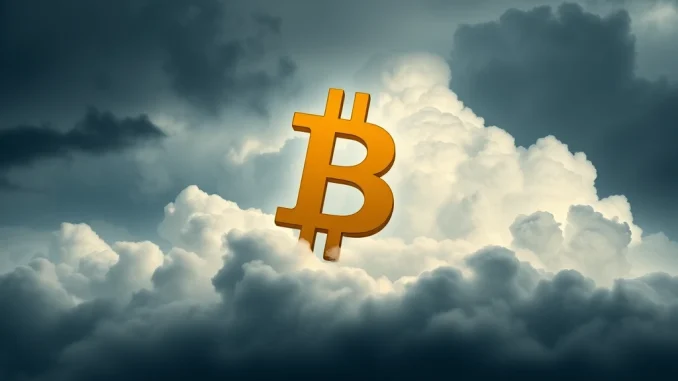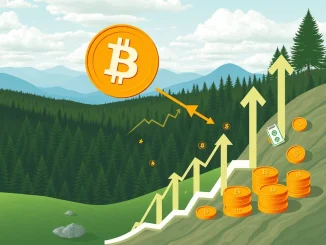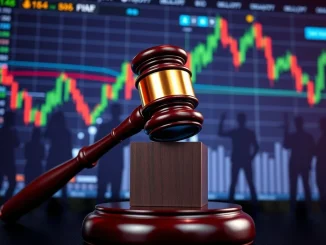
In a world grappling with economic uncertainties, one digital asset continues to stand tall, seemingly unfazed by the tremors of traditional finance. We’re talking about Bitcoin, of course. Amidst the ongoing discussions surrounding former U.S. President Donald Trump’s tariff policies and their potential global impact, a prominent voice from El Salvador has emerged, reaffirming Bitcoin’s resilience. Let’s dive into what Max Keiser, a crypto advisor to the El Salvador government, has to say and why his perspective carries weight in the ever-evolving crypto landscape.
Why Bitcoin’s Resilience is Under the Spotlight?
The global economy is a complex web, and any significant policy shift, especially from a major player like the United States, can send ripples across markets. Trump’s tariff policies, known for their assertive stance on international trade, have indeed caused economic anxieties. These policies, designed to protect domestic industries, often lead to retaliatory tariffs from other nations, potentially sparking trade wars and impacting global economic growth.
In this climate of uncertainty, investors often seek safe-haven assets. Traditionally, assets like gold and the U.S. dollar have played this role. However, the rise of Bitcoin has presented a new contender in the safe-haven arena. But is Bitcoin truly resilient to these kinds of economic shocks? Max Keiser, for one, emphatically believes so.
Max Keiser: A Bitcoin Bull’s Perspective on Economic Turmoil
Max Keiser isn’t just any crypto enthusiast; he’s a well-known figure in the Bitcoin community and an advisor to the government of El Salvador, a nation that has adopted Bitcoin as legal tender. His views on Bitcoin are often strong and unwavering, and his recent comments regarding Bitcoin’s resilience are no exception.
According to a report by Bitcoin.com, Keiser argues that Bitcoin remains resilient in the face of economic headwinds created by Trump’s tariff policies. He goes further, suggesting that traditional financial measures are failing to deliver sustainable improvements in the quality of life for U.S. citizens. Instead, he posits that accumulating Bitcoin is the only genuine path to substantial economic betterment.
Let’s break down Keiser’s argument:
- Critique of Traditional Finance: Keiser is critical of traditional financial systems and their ability to provide long-term economic stability and improvement for the average person. He likely points to issues like inflation, government debt, and the potential for financial crises as inherent weaknesses in the current system.
- Bitcoin as an Alternative: He champions Bitcoin as a viable alternative, emphasizing its decentralized nature, limited supply, and potential to act as a hedge against inflation and economic instability.
- Resilience to External Shocks: Keiser believes Bitcoin’s fundamental properties make it less susceptible to external economic shocks, including those stemming from policies like Trump’s tariffs. This resilience stems from its decentralized and global nature, operating outside the direct control of any single government or financial institution.
Is Bitcoin Truly a Safe Haven Amidst Tariff Tensions?
The question remains: is Bitcoin truly the resilient asset Keiser claims it to be, especially when facing Trump’s tariff policies and broader economic uncertainties? While Bitcoin’s proponents highlight its decentralized nature and scarcity as key strengths, critics point to its volatility and regulatory uncertainties as potential weaknesses.
Here’s a balanced perspective:
| Aspect | Bitcoin as a Safe Haven (Arguments for) | Bitcoin as a Safe Haven (Arguments Against) |
|---|---|---|
| Decentralization | Operates outside government control, less susceptible to political and policy changes in any single nation. | Regulatory uncertainties and potential government crackdowns in various jurisdictions can impact its price and adoption. |
| Limited Supply (21 Million) | Scarcity can act as an inflation hedge, potentially increasing its value during periods of economic instability and currency devaluation. | Volatility: Bitcoin’s price is known for significant fluctuations, making it a risky asset for those seeking short-term stability. |
| Global and Borderless | Transactions are not confined by national borders, offering accessibility and potential refuge during economic crises in specific regions. | Adoption still relatively nascent compared to traditional safe havens like gold. Market maturity and wider acceptance are ongoing processes. |
| Emerging Store of Value | Increasingly recognized as a digital store of value, attracting institutional and retail investors seeking alternatives to traditional assets. | Correlation with traditional markets: In some instances, Bitcoin has shown correlation with stock markets, suggesting it may not always act as a completely independent safe haven. |
El Salvador’s Crypto Bet: A Testament to Bitcoin Confidence?
The fact that Max Keiser is advising the El Salvador government adds another layer to this narrative. El Salvador’s adoption of Bitcoin as legal tender is a bold experiment, and their continued faith in Bitcoin, as echoed by advisors like Keiser, suggests a strong belief in its long-term potential, even amidst global economic uncertainties.
While the long-term impact of Trump’s tariff policies and their effect on Bitcoin remain to be seen, the discourse around Bitcoin’s resilience is crucial. Whether it fully lives up to the safe-haven label in the face of global economic storms is a topic of ongoing debate and observation. However, voices like Max Keiser’s, grounded in a deep conviction in Bitcoin’s fundamentals, ensure that the narrative of Bitcoin’s resilience continues to resonate within the crypto community and beyond.
Final Thoughts: Bitcoin – A Resilient King or a Hopeful Contender?
Max Keiser’s assertion of Bitcoin’s resilience against Trump’s tariff policies highlights a key aspect of Bitcoin’s appeal: its potential to operate outside the traditional financial system and act as a hedge against economic uncertainties. While the debate about its true safe-haven status continues, Bitcoin’s journey through various economic cycles will undoubtedly shape its perception and adoption in the years to come. For now, the narrative of an unstoppable Bitcoin, standing strong amidst economic headwinds, remains a powerful and engaging one within the cryptocurrency world.



